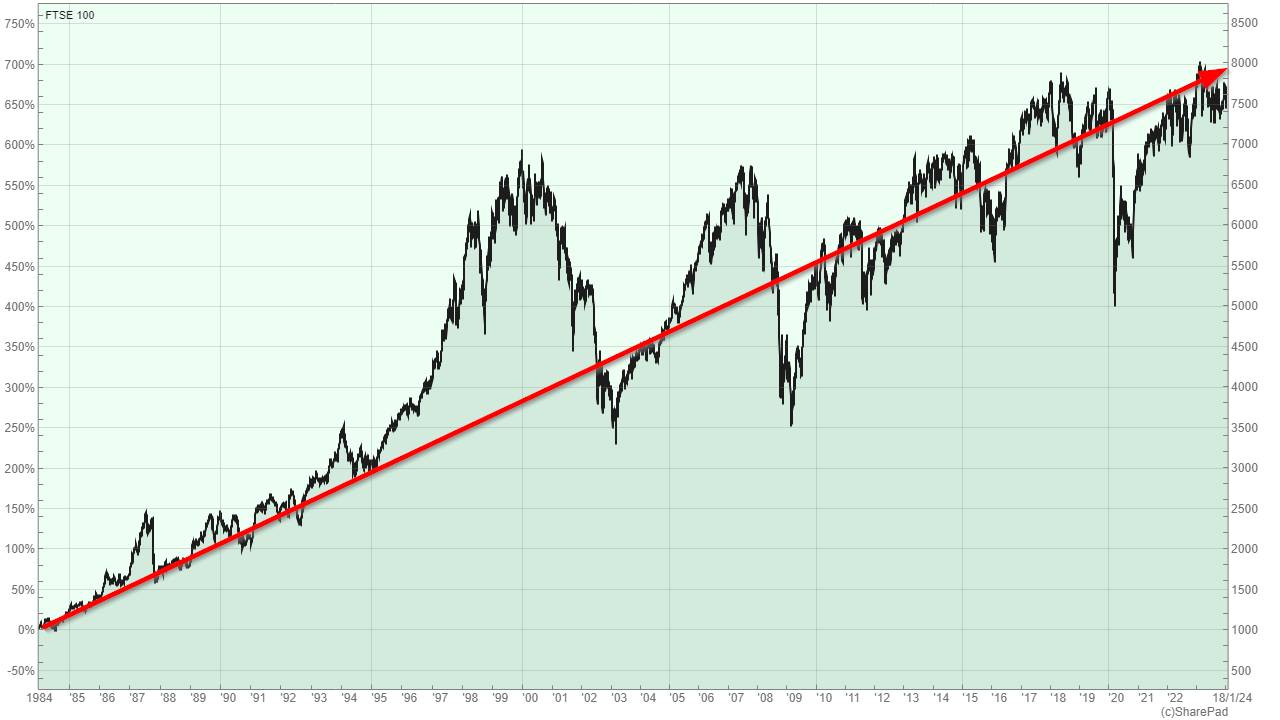The FTSE 100 (Financial Times Stock Exchange 100) is one of the most significant stock market indices in the world, representing the 100 largest companies listed on the London Stock Exchange (LSE) by market capitalization. It is a benchmark of British corporate health, reflecting the performance of major industries, from oil and gas to pharmaceuticals and banking.
How Does FTSE 100 Work?
What is FTSE 100? It’s market-cap-weighted index, meaning that companies with larger market capitalizations have a greater influence on the index’s movements. The index is reviewed quarterly, ensuring that it reflects the latest economic trends and business performances. A rise in the price of shares in larger companies will have a more significant effect on the index compared to smaller companies.
Companies on the FTSE 100 are often multinational, meaning that their profits and revenues are not solely tied to the UK economy but also to global markets. This global exposure is one of the reasons the index is closely watched by international investors.
Top 5 Performers Over the Past Five Years
Over the last five years, the FTSE 100 has witnessed considerable turbulence, influenced by macroeconomic events such as the COVID-19 pandemic, inflationary pressures, and global geopolitical tensions. Here’s a look at the top five performers from the index over the past five years:
- Shell: With strong returns of 76.6% in 2020-2021 and 40.0% in 2021-2022, Shell’s stock was propelled by a recovery in energy prices post-pandemic. However, performance tapered off with just a 1.7% return in 2023-2024 as oil prices fluctuated, especially with crude oil retreating from its highs in 2022.
- BP: Similar to Shell, BP saw a dramatic recovery in its stock during the post-pandemic boom, with a 67.1% rise in 2020-2021, followed by 33.6% in 2021-2022. However, like many oil companies, the decline in oil prices in 2023 saw its stock fall by -18.1%.
- Bellway: The British housebuilder experienced a volatile five years but managed to deliver substantial returns. After a -44.7% dip in 2021-2022, Bellway bounced back with a 44.8% return in 2023-2024, driven by a housing market recovery and government policies supporting home building.
- Whitbread: Operating Premier Inn, Whitbread was hit hard by the pandemic, but it rebounded strongly with a 57.0% gain in 2020-2021 and a 54.3% increase in 2022-2023 as travel and hospitality resumed. However, challenges remain with pricing pressures in 2023 leading to a -7.2% return in the latest year.
- GSK: The pharmaceutical giant, formerly GlaxoSmithKline, posted mixed results over the past five years. It gained 18.2% in 2022-2023 but struggled in earlier years with modest or negative returns. GSK’s focus on vaccines, particularly during the pandemic, buoyed its stock in recent years.
Market Outlook for FTSE 100 Companies in 2024
As we enter the final quarter of 2024, several major FTSE 100 companies are due to release their earnings reports, offering crucial insights into the health of the British economy and global markets. Let’s take a look at what to expect from Shell, BP, GSK, Bellway, and Whitbread in their upcoming earnings:
Shell and BP: October 7 and October 29, 2024
With rising tensions in the Middle East and fluctuations in crude oil prices, Shell and BP are expected to report on challenging market conditions. Crude prices have declined from $130 per barrel in the summer of 2022 to $74 in September 2024. This has strained their profitability, especially with refining margins tightening. Analysts predict both companies may need to borrow to maintain their current dividend and share buyback programs, with Shell likely needing $3.8bn and BP $3.1bn to sustain payouts in 2025.
GSK: October 30, 2024
GSK’s upcoming earnings report will be closely monitored after its underwhelming performance in the interim results, largely due to lower vaccine sales. However, the company has reiterated its guidance for improved sales and profit growth. Investors will be watching closely for updates on litigation surrounding its Zantac ulcer treatment and how this might affect future earnings.
Bellway: October 15, 2024
Bellway’s housing market performance has been resilient in the face of softer trading conditions. While profit margins have declined, the company expects a better 2024-2025 fiscal year, aided by improving customer demand and government support for housebuilding.
Whitbread: October 16, 2024
Operating primarily in the hotel sector through Premier Inn, Whitbread has yet to regain its pre-pandemic levels. While sales have been relatively flat, growth in the German market has provided a boost. Investors will be looking at how the company navigates rising costs and competition in both the UK and Germany.
How Economic Events Influence FTSE 100 Movements
Looking ahead, several external factors will play pivotal roles in determining the FTSE 100’s trajectory. Key among them is the direction of interest rates set by the Bank of England and global economic conditions, including the ongoing conflict in the Middle East and evolving trade relations with the US and Europe.
The recent interest rate cuts by both the Bank of England and the European Central Bank have also influenced how the FTSE 100, particularly export-heavy firms, are perceived. For instance, pharmaceutical companies like GSK, which operate globally, benefit from a weaker pound as their foreign earnings increase when repatriated to the UK.
Conclusion: Navigating the FTSE 100
The FTSE 100 remains a robust indicator of UK economic health, with large companies offering international exposure. Investors must stay vigilant as macroeconomic factors such as interest rates, inflation, and geopolitical tensions create a volatile environment for sectors like energy, pharmaceuticals, and housebuilding.
In summary, while Shell, BP, GSK, Bellway, and Whitbread are likely to face short-term challenges, their long-term growth prospects remain tied to global economic recovery. As always, diversification across sectors remains crucial for navigating this dynamic market.






